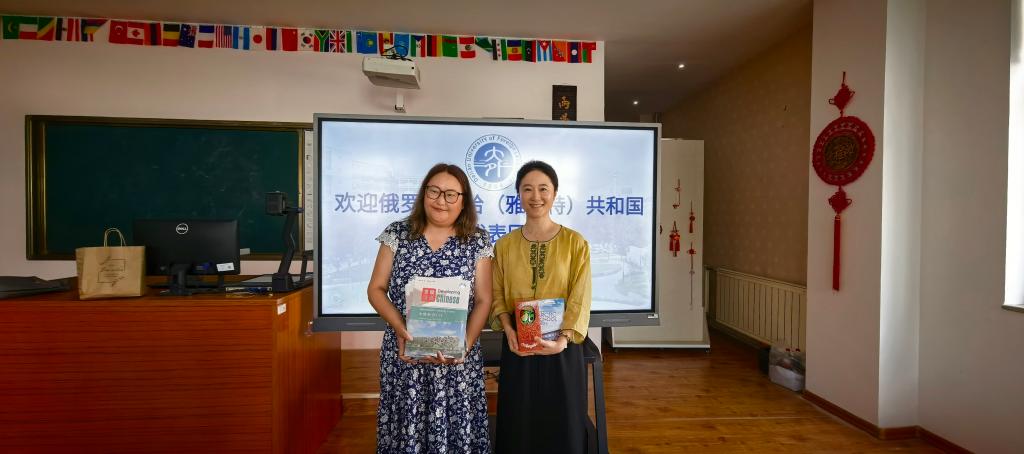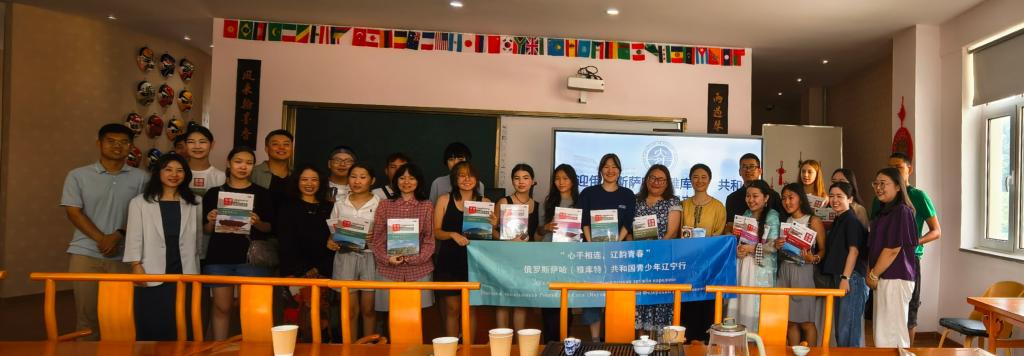On August 21, the delegation’s itinerary focused on “cultural exchange” with a visit to Dalian University of Foreign Languages. The delegation engaged in a round-table exchange with faculty and students. Li Hongjin, Party Secretary of the College of Chinese Studies, Liu Xin, Deputy Party Secretary, Cui Dandan, along with three Chinese and international students from the College of Chinese Studies and six student interpreters from the Russian School, participated in the exchange meeting. The event was presided over by Deputy Party Secretary Liu Xin.


Li Hongjin, Party Secretary of the College of Chinese Studies, extended a warm welcome to the high school youth delegation from the Republic of Sakha (Yakutia), Russia. She stated, “Dalian University of Foreign Languages has always been committed to ‘building bridges of friendship between China and other countries,’ and the College of Chinese Studies serves as a vital window for linguistic and cultural exchanges between China and the rest of the world. The youth represent the future and hope of Sino-Russian friendship, and the arrival of this delegation injects new vitality into the friendship between the young people of our two countries. We look forward to seeing everyone deepen understanding through language interaction, gain friendship through mutual learning of the culture and experience the charm of China through engagement in the coming days.”
Cui Dandan provided a detailed introduction to the university’s international student recruitment, covering aspects from curriculum design to learning experiences, comprehensively showcasing the teaching features and advantages of Dalian University of Foreign Languages. She sincerely invited the delegation members to consider choosing DUFL in the future to genuinely experience the charm of Chinese language and culture.
Following the presentations, faculty and students gathered for interactive activities. Shang Xiaoli, a tea art instructor, delivered an engaging tea art class to the delegation, explaining in detail the types of tea, brewing techniques, and tea ceremony etiquette. She emphasized that tea, as a treasure of Chinese culture, is not only a cultural symbol of China but also an important vehicle for global cultural dissemination—China, as the world’s largest tea producer, shares the fragrance of tea with the world, playing a unique role in promoting dialogue among different civilizations. Her words were filled with pride and passion for Chinese tea culture. The talent performance by the Russian teachers and students brought the event to a climax. First, a Russian student took the stage to sing, with the melodious voice conveying youthful energy and winning applause from all present. Then, two Russian students collaboratively played the “khomus” (jaw harp), a traditional instrument of the Sakha (Yakutia) people. Placing the instrument in their mouths and plucking the reed with hand movements, the unique performance method and ethereal melody immersed everyone in the distinctive charm of Russian ethnic culture.
Both sides presented books as gifts, exchanging publications that carried their respective cultures and friendship. Each volume served as a symbol connecting the two cultures and continuing the bond of goodwill, bearing witness to the precious moments of this exchange.
The visit of the youth delegation from the Republic of Sakha (Yakutia), Russia, served as a bridge for cultural exchange, injecting new vitality into promoting friendly interactions between the young people of both countries and fostering mutual learning between Chinese and Russian cultures. It also stands as a vivid example of building closer Sino-Russian youth partnerships. (By Zhang Rundong)